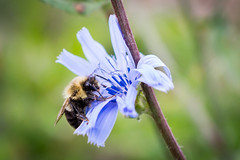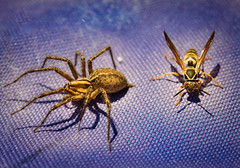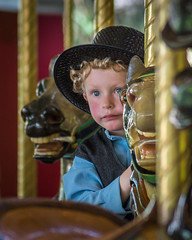Wildlife
Waiting for Winter
Leapin’ Lemurs

These Ring-tailed Lemurs didn’t care to walk among the herd of turtles on their path, so they took to leaping over them. The turtles just watched.
Notice the pink reflection in the water. Those are flamingos on the shore beyond the water’s edge.
I snapped a number of photos of the Lemurs on a recent visit to the zoo in Indianapolis, IN. You’ll see a few more images posted here in the near future, so check back often.
To view a larger version, click on the image.
Doe Eyes
 On a walk along the trails of a Missouri nature center, we encountered this docile woodland beast. One look at that face and the meaning of the term “doe-eyed” becomes crystal clear.
On a walk along the trails of a Missouri nature center, we encountered this docile woodland beast. One look at that face and the meaning of the term “doe-eyed” becomes crystal clear.
Here’s the American Heritage Dictionary definition…
doe-eyed
adjective
1. Having wide-open, innocent-appearing eyes.
2. Credulous and unsophisticated; naive.
For a larger view, click on the photo.
On the Wing

These are Sand Hill Cranes that spent the night in the farm field across the road from our home. They are a very exotic and, unfortunately, elusive bird. I’ve not been able to get close enough to capture any decent pictures.
There were at least a dozen Sand Hill Cranes sharing the field with three or four times as many Canada Geese. I tried to slowly work my way toward them, but before I could get any worthwhile photos they took off. The only saving grace is that a few happened to fly by on their way to some other secluded spot.
Sand Hill Cranes are graceful and somewhat majestic in flight, with a wingspan of six to eight feet. They are also very noisy when flying. (They can be pretty noisy on the ground, too.) Their distinctive “call of the wild” has been described as a bugling or trumpeting sound. It’s very annoying, particularly early in the morning when you’re trying to sleep in. They can be heard long before they are seen.
To see a larger view of either image, simply click on it.
Can’t Hold Her Licker

It happened so fast, I didn’t see this at the time I took the photo. This female, ruby-throated hummingbird was sticking her tongue out at me at the precise moment of the shutter snap.
It’s too bad you can’t see it clearly because the tongue was moving so fast and was out of the range of focus.
Here are some fascinating facts about the hummingbird tongue from www.worldofhummingbirds.com …
The tongue on a hummingbird is very long. It is grooved like the shape of a “W”. On the tip of the tongue are brushy hairs that help lap up nectar from a flower. A hummingbird can lap up nectar at a rate of about thirteen (13) licks per second. Hummingbirds have only a few taste buds on the tongue. Hummingbirds can taste just enough to know what is good and what is bad. They can also taste what is too sweet, not sweet enough, or just right.
(To see a larger version of this image, just click on the photo.)
Humdinger

hum·ding·er/ˈhəmˈdiNGər / Noun: A remarkable or outstanding person or thing of its kind.
There’s little that compares to the dazzle of a male ruby-throated humming bird when the light hits it just right. If you’re able to watch one while he’s perched, you’ll see flashes of brilliant red with just a slight turn of his head.
Even though the sunlight is coming more from behind this bird, I used a shiny surface to reflect some of that sunlight to the front side, bringing out the colors of his gorget (the neck area).
(Click the image to see a larger version.)
All of the photos I post are available for purchase. If you’d like to buy one, click on the blue “Buy this Online” bar below for a variety of print and frame options or contact me for digital purchase and licensing options.
Intense Eater

I had a few minutes before I had to shuffle off to work this morning. I decided to sit still by the window and try to grab a good hummingbird photo or two.
This is a male ruby-throated hummingbird intent on downing his breakfast. I love the way the low angle of the sun strikes and highlights the tiny feathers.
This is one of three good images I captured in this 15 minute setting. I’ll post the others soon, so check back.
Feel free to share this image with friends.
(Click the photo to view a larger version.)
Water Wings

I took this photo at a small wetland area on my drive home. They were closer and on dry ground when I drove up, but as soon as the mama spotted me, she took the kids for a safe swim.
Canada Geese have become so prolific they are often considered a nuisance…but how can you not love the goslings. I counted 11 little ones in this brood.
(Click the image to view a larger version.)
The Flip Side

Those acrobatic clowns from our “Flying Circus” never cease to entertain and amaze.
As the seed level drops in the feeders, the level of creativity and persistence among the American Goldfinch community rises.
The zany, upside-down bird makes this an image worth posting, but I also find the white pattern on the wings of the bird in the middle interesting.
(Click the photo to view a larger version.)
Flying Circus
 There are times when I look out the window of our rural home and think, “What a circus!” Birds are flying in every direction to take advantage of a free meal from one of our many feeders.
There are times when I look out the window of our rural home and think, “What a circus!” Birds are flying in every direction to take advantage of a free meal from one of our many feeders.
Of all the birds we see, the American Goldfinches are among the most active and consistent performers at our house. It can be quite entertaining to watch them zipping in and out; hither and yon.
When frozen by the camera, the Goldfinch’s quick, bouncy style of flight seems unnatural and awkward.
All of the birds in this photo are American Goldfinches – except the one Chipping Sparrow whose tail can bee seen as he perches on the back side of the feeder.
(Click the image for a larger version.)




















































